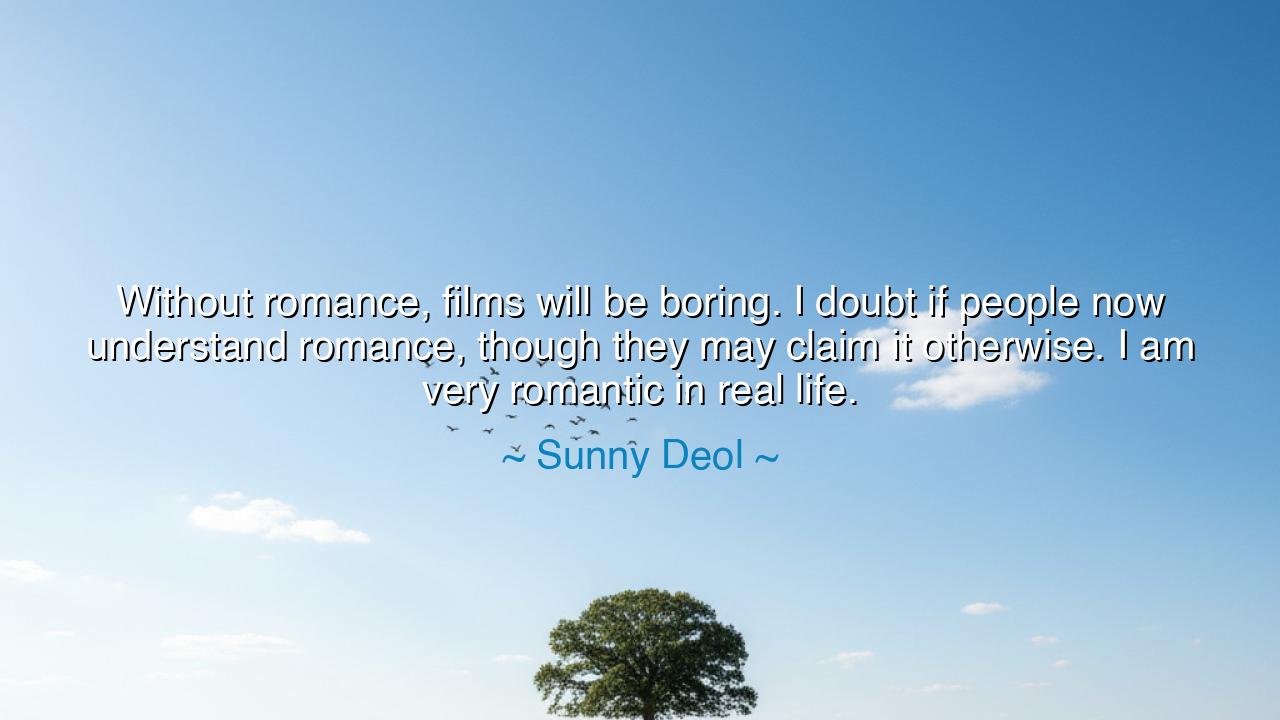
Without romance, films will be boring. I doubt if people now
Without romance, films will be boring. I doubt if people now understand romance, though they may claim it otherwise. I am very romantic in real life.






O Seekers of the Heart, listen closely to the words of Sunny Deol, who speaks of a force that transcends time and place: "Without romance, films will be boring. I doubt if people now understand romance, though they may claim it otherwise. I am very romantic in real life." In these words, Deol touches upon the power of romance—not as a mere decoration of life, but as a vital force, essential to the depth and meaning of human connection. He speaks to a truth older than civilization itself: that romance is a force that transcends mere desire, weaving itself into the very fabric of our lives, whether in the stories we tell, the hearts we bind, or the world we seek to create.
In the ancient world, romance was not simply about passion or the pursuit of love; it was about the connection of souls. The Greek myths, rich with gods and heroes, often revolve around tales of love that are both transcendent and transformative. Orpheus and Eurydice—their story is not just one of love, but of loss, sacrifice, and the unyielding desire to reconnect the lost parts of ourselves. Romeo and Juliet, whose names have become synonymous with romantic tragedy, reflect the ultimate devotion between two lovers, yet their love exists in a world that is deeply intertwined with the forces of fate and society. Even in their deaths, they remind us that romance is not just an individual pursuit, but one that has the power to change the world itself.
Deol’s words also speak to the power of film, which, like the ancient storytellers, serves as a medium to reflect and magnify our deepest human desires. Film has become the modern-day theater, a place where we project our collective fears, hopes, and dreams. To say that without romance, films would be boring is to acknowledge that romance, in its truest form, is not about superficial attraction, but about the profound connection between individuals. It is the emotion that binds characters to one another, elevating a story beyond mere events, transforming it into something deeply felt. Romance, when portrayed truthfully, has the power to make us see the world differently, to make us feel more alive.
In the same way that romantic poetry from Sappho to Petrarch has moved hearts throughout history, films that touch on the essence of romance, whether joyous or tragic, tap into the core of our collective humanity. Hollywood, with all its glamour and gloss, has at times created the illusion that romantic love is only for the young or the beautiful, that it is something unattainable or idealized. But as Deol rightly points out, it is romance in real life—the small moments of connection, the vulnerability and devotion between individuals—that is the true essence of love. In his admission that he is romantic in real life, Deol invites us to remember that true romance is not about perfection but about being real, about the raw, sometimes messy, often beautiful act of sharing your heart with another.
Consider, O Seekers, the story of Abelard and Heloise, whose love, though marred by tragedy and separation, has endured through the ages. Abelard, a scholar, and Heloise, a brilliant student, fell deeply in love, and their letters to one another are a testament to the power of love in the face of intellectual pursuits and religious obligations. Their love was not just about physical attraction but about the meeting of minds and souls, a love that was both intellectual and spiritual. Though their love ended in separation and suffering, it became one of the greatest love stories in history, showing us that romance can transcend the confines of time, circumstance, and even tragedy.
The lesson here, O Seekers, is that romance—in its most profound sense—is not a fleeting feeling, nor is it reserved for the pages of novels or the frames of films. It is a powerful force that shapes our lives, our relationships, and our societies. Like Deol, we must not only seek romance in the art we create, but in the lives we live, in the connections we form, and in the way we choose to love. It is romance that fills the quiet moments between people, that makes our shared experiences meaningful, that transforms the mundane into something extraordinary. When we embrace romance not as a fantasy, but as a real, living force, we open ourselves to the deepest, most genuine connections.
Let us, therefore, live with a heart that is open to romance, in all its forms. Let us not wait for the perfect love, the idealized connection, but instead, let us recognize that the greatest romance often lies in the small acts of kindness, in the vulnerability we share, and in the commitment to another. Like the great poets and filmmakers, let us remember that romance is not just a concept to be admired from afar, but a force to be experienced, to be lived, and to be cherished in the everyday moments of life. In this way, we can make our own lives as rich, profound, and meaningful as the greatest love stories ever told.






AAdministratorAdministrator
Welcome, honored guests. Please leave a comment, we will respond soon